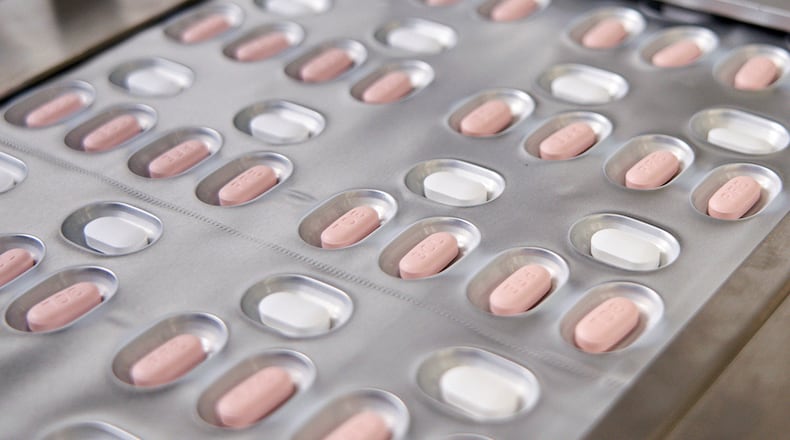“Unfortunately, while we do have some of these newer therapeutics, because of the very limited numbers, it’s a very restricted number of individuals that are going to be able to get them and are usually going to be those that are at highest risk of severe disease or complication,” Dr. Roberto Colón, Miami Valley Hospital chief medical officer, said.
One pill in demand across the country is an antiviral called paxlovid, which is intended to be given soon after symptoms start to people at high risk of developing severe COVID-19.
In clinical trials, it was around 90% effective at keeping high risk COVID-19 patients out of the hospital and alive.
The medications are now being prioritized using federal criteria for people most at risk. Availability ranges around the country from community to community.
“To give you an example, when we first got the oral medication paxlovid, which is the drug that’s made by Pfizer, we only got 20 treatment courses. Two. Zero. And obviously that’s not going to go very far when we have thousands of patients in the region,” said Dr. Jeffrey Weinstein, with Kettering Health.
“It is extremely promising, but extremely limited,” said Dr. Joe Morman, a family physician and Springfield Regional Medical Center associate chief clinical officer, who said Wednesday that they have no paxlovid doses available in Springfield.
Another antiviral in limited supply, molnupiravir, is less effective than paxlovid -- in trials it lowered the risk of COVID-19 hospitalization or death by around 30% for those at high risk.
There are some other limitations with the different therapies. Paxlovid can have negative interactions with some common medications. Molnupiravir shouldn’t be given to pregnant patients.
Manufacturers are stepping up production of treatments, but it’s a complex process. Associated Press previously reported paxlovid takes six to eight months to make. Meanwhile cases and demand are both high.
“The whole world is going to want paxlovid,” Morman said.
There’s extra pressure to increase supplies of these drugs because two monoclonal antibodies that worked well against the delta variant have not held up against the fast-spreading omicron variant, which now accounts for almost all U.S. cases. The FDA advised to no longer use these, and the drug manufacturers Regeneron and Eli Lilly agreed.
There is another monoclonal antibody has better effectiveness against omicron, called sotrovimab. But again, supplies are limited.
“Unfortunately, due to the very restricted, very limited availability, it’s restricted only to very defined population,” Colón said.
Remdesivir, an antiviral drug given by infusion, was first given for patients sick enough to be hospitalized but more recently has been used to treat moderate and mild cases.
“It does require coming into the infusion center, or some people have gotten a first dose at the emergency room and then second and third doses at our infusion center as an outpatient,” said Dr. Jeffrey Weinstein, Patient Safety Officer for Kettering Health.
A drug called Evusheld is the only non-vaccine authorized to prevent infection from COVID-19, to be given before someone is exposed to the virus, according to the CDC.
Given as an intramuscular injection, the monoclonal antibodies can help immunocompromised patients who can’t get a strong protective response from a COVID-19 vaccine.
The FDA states Evusheld was authorized for emergency use the first week of January. In a clinical trial of about 5,000 participants, Evusheld recipients saw a 77% reduced risk of developing COVID-19 compared to those who received a placebo. Manufacturer AstraZeneca said later in December that a lab study found the drug still held up against omicron.
The medication is in very limited supply, with demand high and manufacturing still ramping up. Health networks are distributing and triaging the medication.
“Again, very, very limited,” Colón said.
Physicians continue to emphasize that vaccines are the gold standard for preventing COVID-19 and severe disease.
“Prevention is always better than treatment,” Weinstein said.
About the Author

